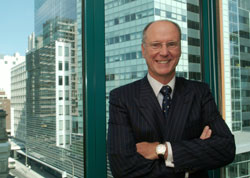Refectory renewal planned by alumni

John Lemieux, a member of the Board of Governors, is involved in a project to restore the Refectory, at the rear of the Loyola Central Building, to its former glory.
photo by iits creative media serivces
For John Lemieux, who got his BA in 1966, the Loyola College campus was far more than just a place for classes. “I played varsity football and basketball, I lived on campus, I was a proctor in the residence — it had a lasting impact,” he says.
Yet Lemieux admits, “Until recently, I had seldom been back to the Loyola Campus since graduating in 1966 except as an ex-Warrior, for the occasional football or basketball game.”
He began to reconnect after his son graduated from Loyola High School a few years ago and he hit a significant birthday.
“I had a post-60 awakening,” Lemieux reveals. “When you’re younger, you think that your success in life is the largely result of your own labours, industry, drive and good luck. But I came to the realization that any success I enjoyed over the last 40 years was very much related to friends made, lessons learned and the early exposure to traditions of excellence that came with being a student at Loyola College. It seemed to me like a good time to give something back.”
Lemieux, a partner with the Montreal law firm Fraser Milner Casgrain, accepted an invitation by alumna Elizabeth McIninch to join the Loyola Alumni Assocation Board of Directors in 2004. In 2005 he became the Association’s representative to the Board of Governors, and he also agreed to co-chair the Loyola Refectory Restoration Campaign with John Collyer, Loyola BComm 66.
The Refectory is located immediately behind the Central Building and connected to the Richard J. Renaud Science Complex. Completed in 1916, the building originally served as a dining hall, infirmary and meeting site for Loyola students, faculty and staff, and it has also housed various Concordia academic and administrative units. Today it’s home to the Department of Music.
The Loyola Refectory Restoration Campaign’s goal is to return the building — to be renamed the Loyola Alumni Hall and Conference Centre — to its former role as a central meeting place that brings together Concordia’s diverse student, faculty, staff and alumni. The plan calls for the first floor to be converted into a facility for large events and meetings, while the second floor will house offices and smaller meeting rooms. There will also be a kitchen and catering services available.
The campaign has become an important project for the Loyola Alumni Association, which is celebrating its 100th birthday in 2006. John Lemieux feels that for Loyola alumni, “the Loyola experience was meaningful in terms of its academic, athletic, religious and social values. Part of what we’re doing is to resurrect these values.”
Just as he has realized the role Loyola played for him, Lemieux feels others will reach the same conclusion.
“I believe this is an historic chance for alumni, before we become fragments of history, to not only leave a meaningful legacy but to have an impact that will last for decades and be a testimony to graduates who’ve made a large contribution to the community.”